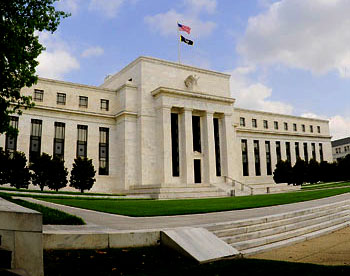I suppose this is a sign that I’ve been well and truly pulled down the rabbit hole, but I’m sort of excited that today brings a behind-the-scenes tick-tock from Jon Hilsenrath about the September 13th Fed  meeting. These kinds of pieces are three-a-penny for decisions made in the White House or on Capitol Hill, but not so common for decisions made in the inner sanctums of the Eccles Building. But as you’ll recall, September’s meeting is the one where the Fed finally decided to implement QE3, and Hilsenrath has the skinny about how it happened:
meeting. These kinds of pieces are three-a-penny for decisions made in the White House or on Capitol Hill, but not so common for decisions made in the inner sanctums of the Eccles Building. But as you’ll recall, September’s meeting is the one where the Fed finally decided to implement QE3, and Hilsenrath has the skinny about how it happened:
For weeks, Mr. Bernanke made dozens of private calls on days, nights and weekends, trying to build broad support for an unusual bond-buying program he wanted approved during the Fed’s September meeting, according to people familiar with the matter.
….Interviews with more than a dozen people involved in the Fed decision, both supporters and opponents, show how Mr. Bernanke won over skeptics to advance his policy—a distinction in a Washington era marked by rancor and gridlock. These people also gave a rare view of the low-key persistence of the former economics professor.
Mr. Bernanke didn’t see inflation as a threat but viewed unemployment as a deeper problem than he had realized. The central bank, in his view, needed to act. The Fed chairman listened to colleagues’ concerns during the calls, people familiar with the matter said, drawing out their reservations and probing for common ground. He eventually seized on a compromise that came from a little-known Fed governor.
….Drawing broad support for the plan was important to Mr. Bernanke in part because the policies he was formulating could outlast him. His term as Fed chairman ends in January 2014. Seeing a return to U.S. full employment as a distant goal, Mr. Bernanke needed the support of officials who might remain at the Fed after he left.
That last bit is an important point. Part of the September 13th announcement included an effort to persuade the market that Fed policies will remain relaxed for many years, even after the economy has started to pick up steam, and to do that Bernanke knew that he needed near unanimity. If the FOMC were bitterly split, after all, who would believe that Bernanke’s policies would genuinely last through 2015 and beyond? So he spent weeks working on his colleagues and fashioning a compromise.
And that, I think, is the key takeaway from Hilsenrath’s piece. Bernanke may not be managing monetary policy as aggressively as a lot of us would like, but he’s really not the roadblock here. His colleagues on the FOMC are.
BY THE WAY: The “little-known” Fed governor who produced the winning compromise turns out to be Elizabeth Duke, a Bush nominee. Go figure.

















